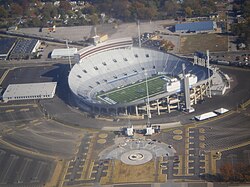| Memphis Tigers | |||
|---|---|---|---|
| |||
 | |||
| First season | 1912; 113 years ago | ||
| Athletic director | Ed Scott | ||
| Head coach | Charles Huff | ||
| Stadium | Simmons Bank Liberty Stadium (capacity: 58,325) | ||
| Year built | 1965 | ||
| Location | Memphis, Tennessee | ||
| NCAA division | Division I FBS | ||
| Conference | American | ||
| All-time record | 552–543–33 (.504) | ||
| Bowl record | 9–8 (.529) | ||
| Conference titles | |||
| Miss. Valley: 1929, 1930 SIAA: 1938 MVC: 1968, 1969, 1971 American: 2014, 2019 | |||
| Conference division titles | |||
| AAC West: 2017, 2018, 2019 | |||
| Rivalries | Arkansas State (rivalry) Cincinnati (rivalry) Louisville (rivalry) Ole Miss (rivalry) Southern Miss (rivalry) UAB (rivalry) | ||
| Colors | Blue and gray [1] | ||
| Fight song | Go Tigers Go | ||
| Mascot | Pouncer | ||
| Marching band | Mighty Sound of the South | ||
| Website | gotigersgo.com | ||
The Memphis Tigers football team represents the University of Memphis in college football in the NCAA Division I Football Bowl Subdivision (FBS). The Tigers play in the American Athletic Conference as an all-sports member. [2] They play home games at Simmons Bank Liberty Stadium. The team's newly-hired head coach is Charles Huff. [3] Since their inaugural season in 1912, the Memphis Tigers have won over 500 games and have appeared in 17 bowl games.
Contents
- History
- Conference affiliations
- Championships
- Conference championships
- Division championships
- Bowl games
- Head coaches
- Rivalries
- Arkansas State
- Cincinnati
- Louisville
- Ole Miss
- Southern Miss
- UAB
- Facilities
- Simmons Bank Liberty Stadium
- Traditions
- The Tiger Walk
- Tiger Lane
- School colors
- Retired numbers
- Memphis Tigers in the NFL draft
- Memphis Tigers awards and honors
- Future non-conference opponents
- References
- External links
For much of its history, the Memphis Tigers football program was subpar with occasional flashes of moderate success while being overshadowed by the university's more successful men's basketball program. [4] However, since the tenure of former head coach Justin Fuente, the Tigers football program has been more successful. [5] [6] As of the end of the 2025 season, Memphis has earned bowl eligibility by winning at least six of 12 regular season games every year since 2014. [7] [8] This is the seventh-longest active streak in the FBS. [8] The program has also claimed eight conference championships, most recently in 2019.
